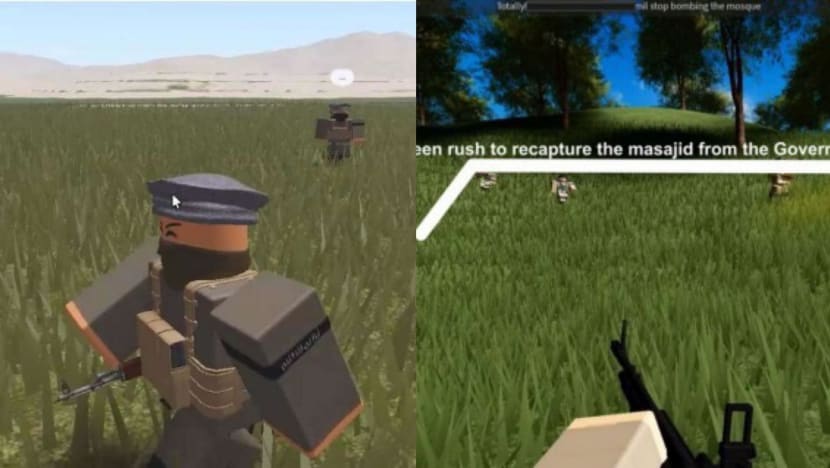Commentary: Amid fears of radicalisation via gaming, parents need to step up and listen to their children
Adults need to take an interest in what youths do on gaming platforms - not just a superficial interest, but to genuinely try it out for ourselves, says NUS lecturer Jonathan Sim.

SINGAPORE: Once again, gaming platforms are back in the spotlight of public scrutiny. Just a few weeks ago, it was announced that two teenagers in Singapore were dealt with under the Internal Security Act (ISA) for terrorism-related activities after becoming self-radicalised through platforms such as Roblox and Discord.
As adults, we often question the influence of gaming platforms on youths, and we label such platforms a negative influence. There is this idea that young people flock to gaming platforms merely for idle entertainment.
But have we ever stopped to consider the perspective of young people themselves?
Young people often feel very misunderstood when it comes to games. The more we hold to this uninformed view, the more we will alienate youths and further reinforce their beliefs that the “adults just don’t get it”.
As an educator and gamer myself, I’ve seen the value that games can bring to our lives and the lives of youths. Perhaps what we need is a shift in mindsets before we can have any productive discussions about gaming and youths.
DESIRE FOR CONNECTION
In reality, what drives youths is a universal and fundamental human need: The desire for connection, understanding, and a sense of belonging.
Some can fulfil this need with people they meet in the offline physical world.
But for many others, gaming platforms such as Roblox and Discord provide the perfect environment to fulfil this need. There are many opportunities to find communities of like-minded peers sharing similar values and interests - people who really understand them in their current state of life.
Through these interactions, youths hope to discover more about who they are and who they desire to be. In that process, they will seek out peers who can inspire them as role models on the kind of person they want to become.
But there’s a catch. Without proper guidance, it can be challenging for an inexperienced person to identify suitable role models. While there are decent peers on these platforms who can be good role models, there are also unsavoury individuals who may lead others down a path of extremism or other harmful behaviour.
As you can see, the drive for human connection and to discover one’s identity is not limited to the online world: It is a universal human need that we all share.
Thus, it is crucial to understand that problems we typically attribute to gaming platforms (like self-radicalisation) are not special tech problems or gaming problems. They can and do happen offline as well.
What we are dealing with is essentially a human problem that so happens to occur on technological platforms.
Framing this as a human problem, we now have an interesting question that we rarely ask: Why are youths not well-equipped to identify positive role models amongst their peers?
ADULTS HAVE CREATED BARRIERS FOR YOUTHS TO COMMUNICATE WITH US
I have been an educator for seven years and I have had countless conversations with students that reveal a sobering truth: Despite youths’ yearning for guidance and life skills from adults, we have unintentionally erected barriers that make it difficult for them to communicate and learn from us.
On one hand, adults are not creating a conducive environment for youths to talk about their experiences on gaming platforms. Whether it’s due to a lack of interest or a barrage of negative criticism from those with a biased perspective, the result is that youths feel discouraged from sharing, and we lose precious opportunities to supervise and guide them on how to navigate through the complexities of life.
On the other hand, when we say things like “I am too old for this” or “We didn’t have these devices or platforms back in my day”, we push youths away and send them the message that our life experiences are irrelevant to them.
And because we have been unintentionally discrediting ourselves, we do not realise that we are sending more and more youths to seek answers to life issues from their peers on these gaming platforms and more.
But there is hope. We adults have the power to bridge this gap.
We need to take an interest in what youths do on gaming platforms - not just a superficial interest, but to genuinely try it out for ourselves.
LISTEN: How does a young person become radicalised?
Understandably, many of us have the fear that diving into such unknown territory can make us look foolish or out of touch. But the truth is, youths will have more respect for us when we try to understand their interests - it’s natural to feel joy when sharing our passion with someone who matters in our lives.
The more we try to understand the games they play and the people they meet online, the more we will discover that our experiences and life lessons are still relevant despite the technological advances - because at the heart of it all, the human need for connection remains constant. Youths are driven by that same human need for belonging and understanding that we all share.
By taking an active interest in what youths do on gaming platforms, we create new avenues for communication and understanding. They will feel heard and valued, and in turn, be more open to sharing their experiences with us. This will provide us with many precious opportunities where we can guide them on how to discern good role models, share our life stories, and offer guidance on other life issues in ways that they can relate to.
The world of youths may be different from what we are used to, but we need to recognise that gaming platforms can be a valuable tool for fostering deeper relationships and understanding.
It’s time for us adults to embrace the culture of youths to connect more effectively with them.
Let’s break down these barriers so that they can learn from us, as we learn from them.
Jonathan Sim is Lecturer, Department of Philosophy, at the National University of Singapore.


















